Learn how the Congo's untamed spirit reshapes the Price family in 'The Poisonwood Bible,' where every character conceals a labyrinth of secrets.
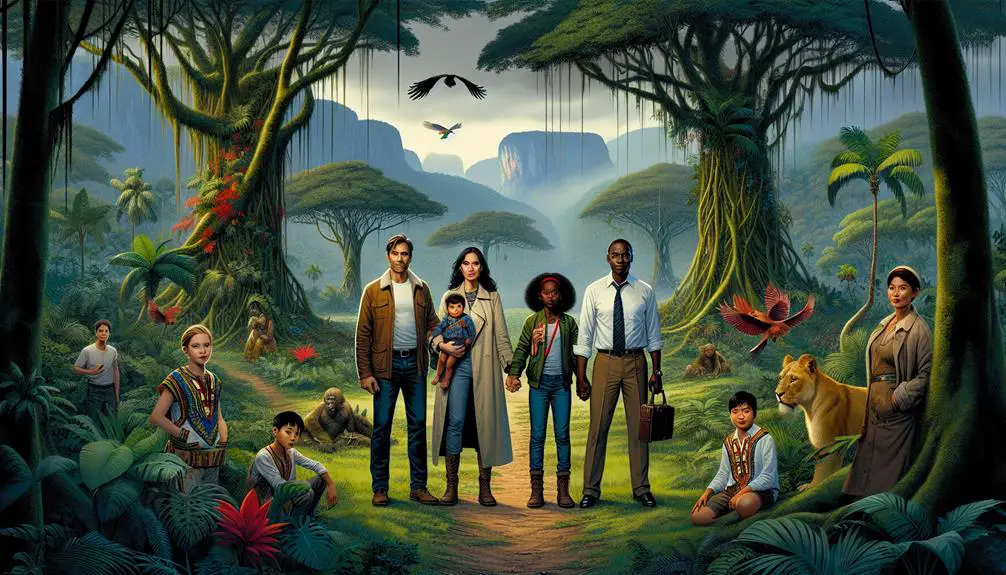
Characters in the Poisonwood Bible
In the tangled tapestry of 'The Poisonwood Bible,' you'll find characters complex and compelling, each unraveling in the relentless heat of the Congo.
Nathan Price, the patriarch, leads his family with a rigid righteousness that ricochets through their lives, while Orleanna, the matriarch, navigates her marriage's murky waters and the challenges of motherhood in a foreign land.
Their daughters, each distinct in her voice and vision, explore themes of faith, independence, and guilt. But it's the silent whispers of the Congo, a character in its own right, that might just capture your curiosity the most.
How does this setting shape the Prices, and what lessons, if any, do they learn from this land that refuses to be tamed?
Key Takeaways
- Nathan Price's zealotry and refusal to adapt highlight the dangers of unchecked missionary zeal and paternalism.
- Orleanna and Leah Price evolve, showcasing resilience and a commitment to social justice, respectively.
- Secondary characters like Anatole and Mama Tataba play crucial roles in challenging cultural arrogance and promoting understanding.
- The novel explores themes of colonialism, ethical dilemmas in activism, and the importance of personal growth through its characters.
Nathan Price: The Patriarch
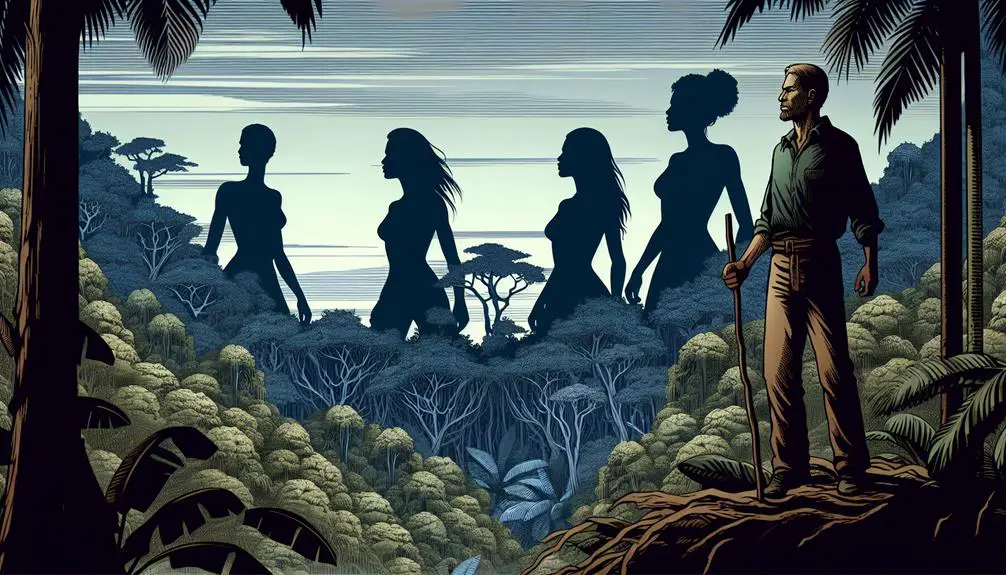
Nathan Price, the patriarch in 'The Poisonwood Bible,' casts a long shadow over his family, embodying the complexities and contradictions of zealotry and paternalism. His character is a profound exploration of the dangers inherent in unchecked missionary zeal, which ultimately leads to his downfall. Through Nathan, you're invited to consider the fine line between faith and fanaticism, and the impact this balance has on those he's sworn to protect and guide.
Nathan's missionary zeal, while initially portrayed as a noble pursuit, quickly reveals itself as a rigid and uncompromising force. His refusal to adapt to the cultural and environmental context of the Congo serves as a stark illustration of his inability to see beyond his own convictions. This rigidity not only alienates him from the community he seeks to convert but also fractures his relationship with his family. It's his unyielding nature that catalyzes his downfall, marking a critical examination of the consequences of imposing one's beliefs onto others without empathy or understanding.
Moreover, Nathan's paternalism, intertwined with his religious fervor, adds another layer to his complex character. You see how his desire to lead and protect is marred by a controlling and authoritarian approach, highlighting the paradox of his intentions versus their outcomes. His story serves as a cautionary tale about the perils of zealotry unchecked by self-awareness and adaptability, offering a nuanced critique of paternalistic missionary endeavors. Through Nathan Price, you're compelled to reflect on the broader implications of zeal and the importance of humility and flexibility in leadership.
Orleanna Price: The Matriarch

In stark contrast to Nathan's rigid zealotry, Orleanna Price embodies resilience and adaptability, serving as the backbone of her family amidst their tumultuous life in the Congo. You observe her evolution from a passive wife to a figure of strength, navigating the complexities of her environment and the internal turmoil caused by her husband's mission. Orleanna's guilt over her role in bringing her children to a place of danger and uncertainty is a recurring theme that adds depth to her character. This guilt isn't just a reflection of her own choices but also a commentary on the broader implications of colonialism and the recklessness of imposing one's beliefs on another culture.
The concept of maternal sacrifice is central to understanding Orleanna. You see her grappling with the limitations of her power to protect her children, a struggle that resonates with the universal challenges of motherhood. Her sacrifices are both physical, as she endures the harsh realities of life in the Congo, and emotional, as she navigates her complicated relationship with Nathan and the impact of his actions on their family.
Orleanna's journey is emblematic of the resilience of the human spirit. Her ability to adapt, reflect, and ultimately forge a path forward for herself and her children is a testament to her strength. Through Orleanna, you're invited to consider the nuances of guilt, the weight of maternal sacrifice, and the possibility of redemption. Her story is a powerful reminder of the capacity for change and the enduring nature of love in the face of adversity.
Rachel Price: The Eldest Daughter

As you explore Rachel Price's narrative in 'The Poisonwood Bible,' you'll notice her cultural adaptation and personal growth journey marking significant milestones in her character development.
Initially, Rachel's superficial perception of her new environment starkly contrasts with her eventual nuanced understanding, illustrating her complex evolution.
This transformation not only enriches her character arc but also offers a critical lens through which to examine themes of identity and resilience in the novel.
Rachel's Cultural Adaptation
Rachel Price's journey through cultural adaptation in 'The Poisonwood Bible' showcases her struggle and resilience as she navigates the complexities of integrating into Congolese society. Her experiences with marriage dynamics illustrate not just personal transformation but also the broader cultural collisions occurring within her new home. Rachel's initial resistance to change is palpable, yet over time, her adaptation is evident in her evolving relationships and the compromises she makes.
Furthermore, her fashion choices serve as a litmus test for her cultural assimilation. Initially clinging to American styles, Rachel gradually incorporates local elements into her wardrobe, symbolizing a shift towards a more harmonious blend of her identity and her surroundings. This gradual shift underscores the nuanced process of cultural adaptation, reflecting a journey of acceptance and change.
Personal Growth Journey
Throughout her journey in 'The Poisonwood Bible,' the eldest Price daughter, Rachel, exhibits a complex evolution, marking her personal growth amidst the challenges she faces in the Congo.
Stage of Journey |
Character Evolution |
|---|---|
Initial Arrival |
Struggles with adaptability, highlighting family dynamics tension. |
Cultural Shock |
Exhibits resistance, yet begins to display signs of individual resilience. |
Midway Through |
Rachel's encounters with adversity lead to a deeper understanding of her strengths and weaknesses. |
Towards the End |
Demonstrates significant personal growth, navigating through family dynamics with newfound maturity. |
Conclusion |
Emerges as a character of resilience, embodying the essence of individual growth despite enduring hardships. |
Rachel's story is a testament to the power of resilience and the intricate dance between family dynamics and personal evolution.
Leah Price: The Committed

You'll find Leah Price's character arc in 'The Poisonwood Bible' a rich tapestry of moral evolution, rooted in her unwavering commitment to social justice. Her journey is marked by deep relationships that catalyze her personal growth, challenging her to confront and transcend her father's rigid ideologies.
This exploration into Leah's development offers a nuanced perspective on the interplay between individual agency and societal change, underscoring her role as a dynamic force within the narrative.
Leah's Moral Evolution
Leah Price's moral evolution represents a profound journey of self-awareness and commitment, as she navigates the complexities of her environment and personal beliefs. You witness her grapple with ethical dilemmas that challenge her initial worldviews, leading to transformative events that reshape her understanding of right and wrong. These moments are pivotal, as Leah begins to question the dogmatic teachings of her father and the societal structures around her.
Her growth is marked by an increasing ability to empathize with the Congolese people, moving beyond the paternalistic mindset she was raised with. This evolution isn't sudden; it's a gradual awakening fueled by her experiences, reflections, and the harsh realities she faces. Leah's journey underscores the importance of confronting one's beliefs and the transformative power of critical self-reflection.
Commitment to Social Justice
Building on her moral evolution, Leah Price's actions become a testament to her profound commitment to social justice, reflecting a deep engagement with the struggles of the Congolese people she comes to stand in solidarity with. Her journey underscores the complexity of global activism, navigating ethical dilemmas that challenge her beliefs and actions. Leah's dedication not only illuminates her personal growth but also casts a spotlight on the broader implications of ethical engagement in a global context.
Theme |
Significance |
|---|---|
Solidarity |
Embodies deep connection with local struggles. |
Ethical Dilemmas |
Highlights challenges in global activism. |
Commitment |
Shows unwavering support for justice. |
Global Activism |
Points to broader implications of engagement. |
Leah's story is a powerful narrative that explores the intricacies of commitment to social justice.
Relationships and Personal Growth
Throughout her transformative journey, relationships significantly shape Leah Price's personal growth, deeply intertwining with her unwavering commitment to social justice.
The family dynamics in the Price household serve as a fertile ground for Leah's development, illustrating how internal relationships can both challenge and foster personal evolution. Her father's authoritarianism catalyzes her quest for autonomy, pushing her to critically examine her surroundings and her place within them.
Leah's engagement with external conflicts, particularly those related to the social and political turmoil of the Congo, further molds her character. These encounters expose her to perspectives beyond her initial understanding, compelling her to reconcile her beliefs with the complex realities of the world.
Thus, Leah's journey underscores how relationships, both familial and external, are pivotal in steering personal growth and ideological maturation.
Adah Price: The Observer
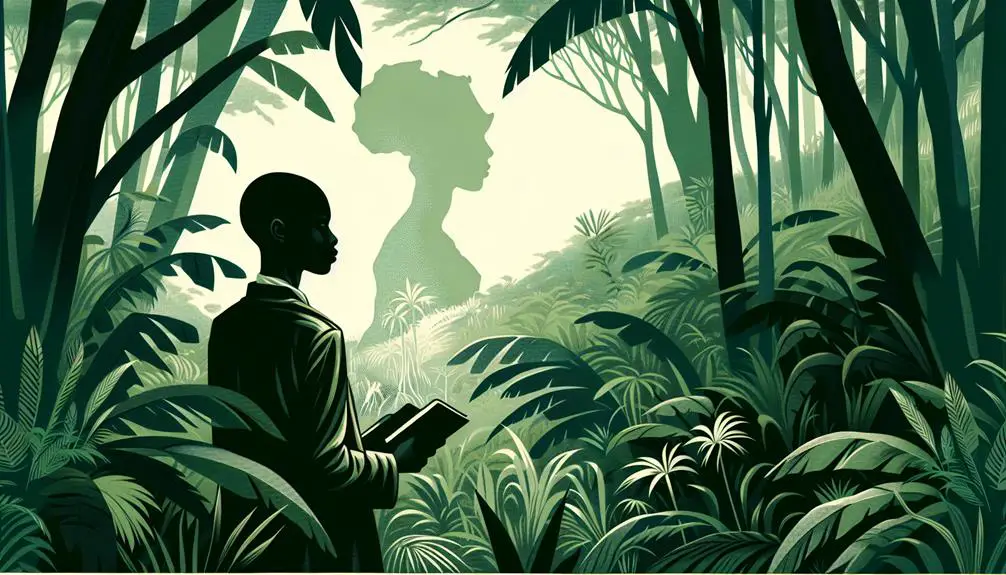
Adah Price serves as a keen observer, her unique perspective offering profound insights into the complexities of her family's dynamics and the broader cultural context they navigate. Living with a physical disability that leaves her without a voice in the traditional sense, Adah's internal world is rich with observations and reflections that are both sharp and deeply introspective. Her mirror identity, a concept that captures her sense of being a reflection of those around her, coupled with her linguistic brilliance, allows Adah to dissect and critique her environment with an acuity that's unmatched by her sisters.
Through Adah, you're invited to explore themes of silence, invisibility, and the power of observation. Her disability, rather than limiting her, expands her understanding and perception of the world, making her a conduit for exploring the nuances of cultural and personal identity within the novel. Adah's linguistic playfulness not only showcases her intelligence but also serves as a coping mechanism, a way for her to navigate and make sense of the often harsh realities of her family's missionary life in the Congo.
Her role as an observer transcends the boundaries of passive watching; it's an active engagement with the world. Adah's reflections are imbued with a sense of moral and ethical questioning, challenging you to contemplate the implications of her family's actions and the broader colonial enterprise they're a part of. Through her eyes, the novel interrogates themes of guilt, complicity, and the complex layers of human interaction in a cross-cultural setting.
Ruth May Price: The Innocent
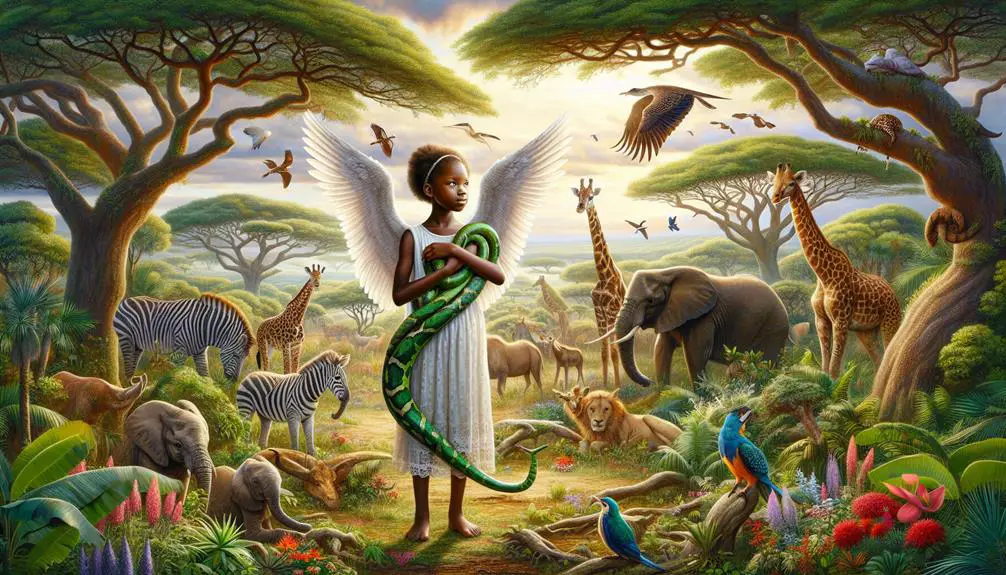
Within the canvas of 'The Poisonwood Bible,' Ruth May Price emerges as the embodiment of innocence, her youthful naiveté casting a stark contrast against the complex moral and cultural landscapes navigated by her family in the Congo. You observe her experiences through a childhood perspective that illuminates the story's darker themes, allowing a unique insight into the spiritual symbolism that threads throughout the narrative.
Dimension |
Ruth May Price |
Analysis |
|---|---|---|
Innocence |
Youthful naïveté |
Stark contrast to Congo's complexities. |
Perspective |
Childhood viewpoint |
Unique insight into the novel's themes. |
Symbolism |
Spiritual imagery |
Represents hope and purity amid adversity. |
Ruth May's innocence isn't just a backdrop to the story; it's a lens through which you perceive the spiritual symbolism that Barbara Kingsolver intricately weaves into the narrative. Her simplistic, yet profound, understanding of the world around her adds layers of meaning to the family's struggles and the larger socio-political turmoil they find themselves embroiled in.
You'll find that Ruth May's character is a reminder of the innate goodness and purity that can exist even in the most trying circumstances. Her presence in the novel serves not only as a contrast to the complexities encountered by the Price family but also as a beacon of hope. Through her, you're invited to explore the powerful impact of innocence and its ability to transcend the boundaries of cultural and moral dilemmas. Ruth May, through her untainted gaze, offers a poignant reflection on the human spirit, making her an indispensable part of the narrative's exploration of faith, resilience, and redemption.
The Congo: A Character
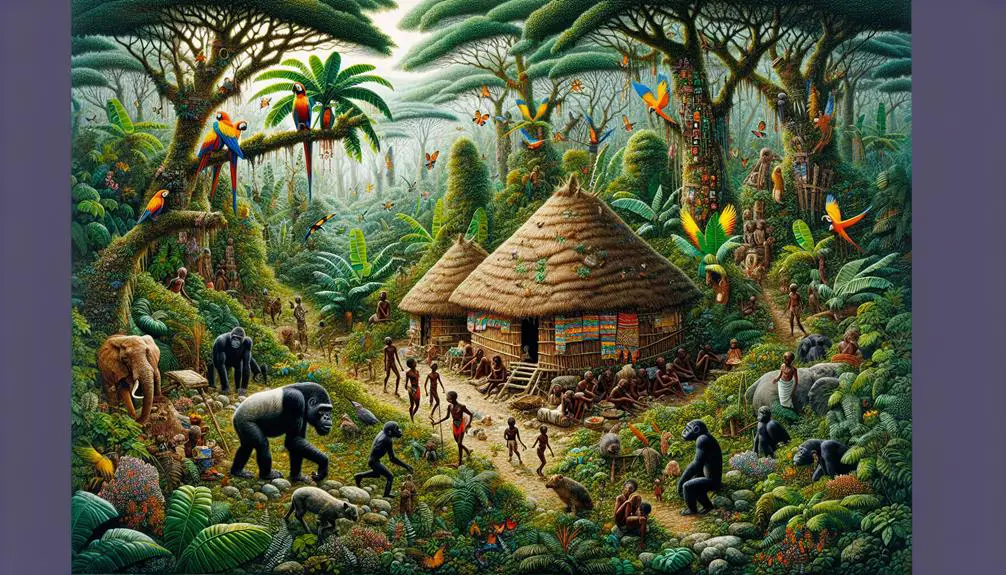
In 'The Poisonwood Bible,' the Congo transcends mere setting to emerge as a vibrant, complex character in its own right, shaping the narrative and the destinies of those within it. You're not merely observing a backdrop; you're being invited to comprehend a living, breathing entity that's as crucial to the storyline as any human character. The Congo, with its dense forests and sprawling rivers, isn't passive. It challenges, nurtures, and, at times, overwhelms the Price family with its sheer power and unpredictability.
The cultural backdrop of the Congo serves as a canvas against which the personal transformations of the Price family are painted. You witness their struggles, not just with the tangible environmental challenges, but also with understanding and integrating into a society vastly different from their own. These cultural and environmental challenges aren't mere hurdles; they're catalysts for change, pushing each character to their limits and beyond, forcing them to adapt or falter. The Congo demands respect, offering lessons in humility and resilience.
Moreover, the environmental challenges faced by the Price family—ranging from the relentless rain to the omnipresent dangers lurking within the Congo's dense foliage—are emblematic of the larger, more existential trials they face. These trials are a crucible, testing and revealing each character's true nature. The Congo, in its untamed majesty and indifference, mirrors the inner turmoil of the characters, becoming an essential force that shapes their journey, for better or worse.
Thus, in 'The Poisonwood Bible,' the Congo stands tall, not just as a setting, but as a pivotal character that molds the narrative through its cultural depth and environmental rigor.
Secondary Characters and Influences
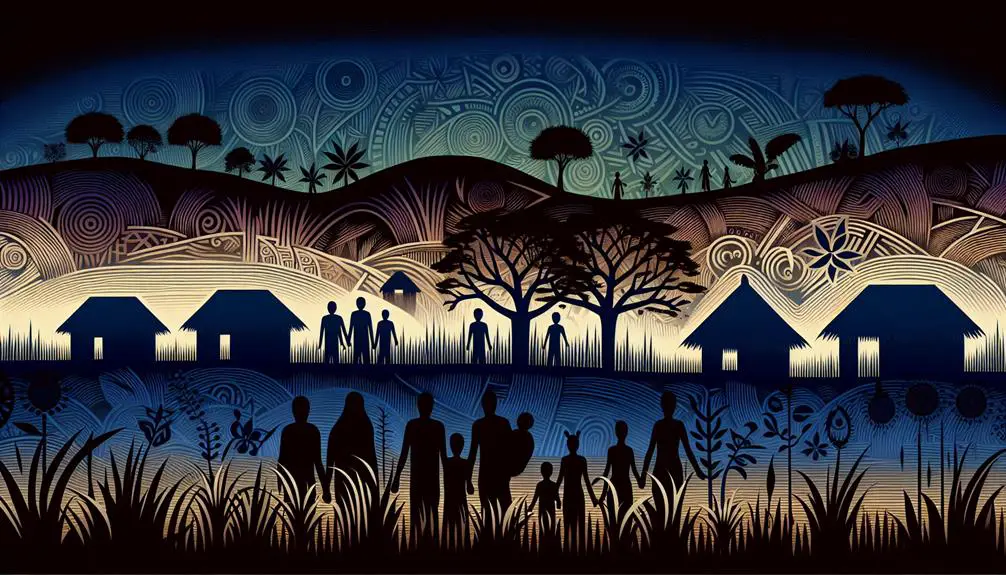
Several secondary characters significantly shape the narrative of 'The Poisonwood Bible,' each bringing unique influences that challenge and transform the main characters in profound ways. These characters, through their interactions, facilitate a deeper understanding of the complex dynamics between different cultures, highlighting the importance of cultural immersion and the impact of local influence.
You'll find that characters like Anatole, a Congolese teacher, and Mama Tataba, a housekeeper, play pivotal roles in bridging the gap between the Price family and the Congolese community. They serve not just as guides into the unfamiliar world but also as catalysts for change, challenging the Price family's preconceived notions and encouraging a more profound, respectful engagement with their new environment.
Character |
Impact |
|---|---|
Anatole |
Encourages political and cultural awareness, leading to a shift in the family's understanding of their role in the Congo. |
Mama Tataba |
Highlights the practical and ideological conflicts between the Prices and their surroundings, sparking initial cultural immersion. |
Brother Fowles |
Offers a contrasting model of religious and cultural interaction, emphasizing coexistence and mutual respect. |
Through these interactions, you're led to see how secondary characters are instrumental in the novel's exploration of themes such as colonialism, cultural arrogance, and the possibility of understanding across vast divides. Their presence underlines the narrative's insistence on the importance of listening to and learning from those who are different from ourselves, illustrating that true cultural immersion requires humility, openness, and the willingness to be transformed by local influence.
Frequently Asked Questions
How Do the Characters' Relationships Evolve With the Congolese Community Outside of Their Immediate Family Dynamics?
You'll notice that as characters interact with the Congolese community, their relationships evolve significantly. This shift isn't just about getting used to new surroundings; it's a deep journey of cultural assimilation and developing interpersonal empathy.
Initially, they might struggle, but over time, they learn to understand and appreciate the local culture and perspectives. This evolution highlights a profound connection beyond their family, reflecting a scholarly analysis of human adaptability and cultural integration.
In What Ways Do the Historical and Political Events of the Time Period Influence the Personal Growth and Development of Each Price Family Member?
You'll find that historical and political events deeply impact personal growth. Through cultural assimilation, you see how individuals adapt, adopting new norms that reshape their identities.
Gender roles, influenced by these events, also play a crucial part in personal development, challenging traditional views and fostering growth.
Analyzing such dynamics offers insightful perspectives on how external pressures can sculpt one's evolution, much like the characters in the Poisonwood Bible experience.
Are There Any Significant Symbols Associated With Each Character, and How Do These Symbols Contribute to the Overall Narrative of "The Poisonwood Bible"?
Diving into this literary garden, you'll find that symbols flourish, intertwining with each character's evolution. Garden symbolism, representing growth and decay, mirrors their journeys, while animal imagery reflects their personalities and fates.
These symbols aren't just decorative vines; they're the roots that anchor the narrative, offering deeper insights into the story's themes. By analyzing these, you uncover layers of meaning, enhancing your understanding of the overarching narrative in a scholarly manner.
How Does Barbara Kingsolver Use Language and Dialect to Distinguish Between the Voices of the Price Family Members and the Congolese Characters?
You'll notice Barbara Kingsolver masterfully uses linguistic authenticity to differentiate voices within her narrative. By incorporating specific language and dialect, she ensures each Price family member and Congolese character is distinct, enriching the narrative's perspective.
This technique not only adds depth but also enhances realism, allowing you to immerse fully in their diverse worldviews. It's a scholarly insight into how language shapes our understanding of characters and their cultural backgrounds.
Can Parallels Be Drawn Between the Price Family's Journey and Biblical Stories, Beyond the Explicit References Made by Nathan Price? How Do These Parallels Affect the Interpretation of the Novel's Themes?
Absolutely, you can draw parallels between the Price family's journey and biblical stories. Beyond Nathan Price's explicit references, consider Garden parallels and Animal metaphors to enrich your analysis.
For instance, the Congo represents a Garden of Eden, a paradise lost through misunderstanding and cultural imposition. These biblical echoes deepen the novel's themes of guilt, redemption, and the complex nature of sin, offering a rich, multi-layered interpretation that's both analytical and insightful.
Conclusion
In 'The Poisonwood Bible,' you witness the Price family's harrowing journey, where personal flaws clash with cultural complexities. Nathan's rigid patriarchy contrasts sharply with the Congo's unforgiving nature, highlighting a battle between control and chaos.
As each daughter embodies varying responses to adversity, their characters offer a mirror to humanity's multifaceted struggle with faith, identity, and survival. Through their eyes, you're invited to explore the depths of resilience and the price of arrogance, making the Congo not just a setting, but a pivotal character in its own right.



Sign up